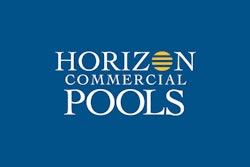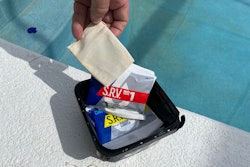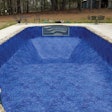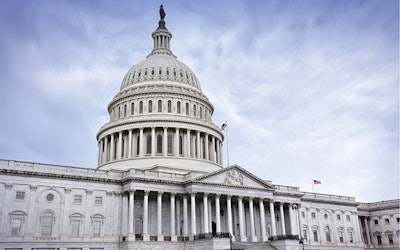
Since the inauguration, President Trump has initiated a series of sweeping changes in policy, with more to come. The question on everybody's mind is, "How will the new administration affect me?"
Only time will tell for sure, but since the same party controls both chambers of Congress and the executive branch, there is a good chance that significant legislation will pass and become law. An industry that sits back and waits for these changes to happen puts itself at risk. That's why The Association of Pool & Spa Professionals operates a proactive government relations program.
"Any time your business model could be affected by legislation, you should be engaged. Reactionary lobbying is ineffective," says Carl Chidlow, principal at Winning Strategies Washington, an advocacy firm that supports APSP Coalition efforts.
Issues at the forefront include tax reform, energy efficiency standards, health care and more.
Tackling Tax Reform
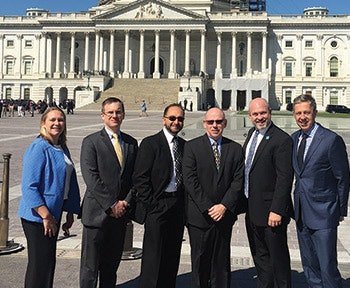 APSP visits Capitol Hill to fight for recognition of energy efficient pool pumps & motors. (Left to Right) Jennifer Hatfield, APSP; Scott Petty, Hayward Industries, Inc.; Shajee Siddiqui, Zodiac Pool Systems, Inc.; Joe Valentino, Speck Pumps- Pool Products, Inc.; Jeff Farlow, Pentair Aquatic Systems; Rich Gottwald, APSP
APSP visits Capitol Hill to fight for recognition of energy efficient pool pumps & motors. (Left to Right) Jennifer Hatfield, APSP; Scott Petty, Hayward Industries, Inc.; Shajee Siddiqui, Zodiac Pool Systems, Inc.; Joe Valentino, Speck Pumps- Pool Products, Inc.; Jeff Farlow, Pentair Aquatic Systems; Rich Gottwald, APSP
The wheels are turning to make tax reform a reality. For pool and spa professionals, this presents an opportunity that has been years in the making. In addition to tax cuts that could benefit the business community in general, other reforms could provide a boon to the pool and spa industry, thanks to ongoing efforts by APSP and its coalitions. "Along with the bigger picture, we have been looking specifically at what reform could mean for energy efficiency tax credits," says Jennifer Hatfield, director of government affairs for APSP.
Some background: Tax credits under current law reward homeowners for upgrades they would have made anyway. "Right now, someone could replace a window that was broken by a baseball and then get the credit, which doesn't really achieve the intended goal of the program," Chidlow says.
Legislators have been struggling with this issue for awhile, putting forth various proposals in anticipation that tax reform would go from idea to reality. An earlier proposal specifically prohibited homeowners from receiving an energy credit for retrofitting their pools with energy-efficient equipment. If this APSP-opposed legislation had passed, homeowners would not have received any tax relief for making their pools more energy efficient.
In response, the APSP Energy Efficiency coalition launched an advocacy campaign to educate legislators about the energy savings that would occur if homeowners retrofitted their pools. The coalition was successful in getting the negative language removed from the Senate version of the bill.
Instead, new language emphasizes a holistic approach to reducing energy consumption. The hope is that the House version of the bill also will adopt performance-based incentives to encourage homeowners to reduce energy consumption.
"There is a real science behind the energy use of a property," Chidlow says. Tax incentives should reward homeowners for reducing the overall number by some percentage, he adds.
There would be no mandate to reach that number in a specific way. Homeowners can decide how they want to go about it, but they could make large gains in efficiency by conducting retrofits on their pools.
"Retrofitting pumps and motors is a good way to help lower energy use and achieve the targets necessary to earn the proposed credit," Chidlow says. "If it tips the needle to get more homeowners to do extensive retrofits, installers and contractors will be busy."
Federal Agencies and Standards
As part of its advocacy efforts, APSP will continue to monitor and work with key agencies that affect the industry, including the Department of Energy and the Environmental Protection Agency.
"We're going to watch the direction of these agencies closely," Hatfield says. "We don't know what DOE is going to do, what regulations they will keep and what gets rolled back."
For instance, prior to the election, APSP had worked directly with DOE on developing standards for dedicated-purpose pool pumps. The rule was finalized and published on January 18, just days before the new administration took office. The Department simultaneously published a proposed rule, offering another opportunity for comment. "APSP is currently reviewing this rule to determine what suggested changes were incorporated. If no adverse comments are received by the deadline, we expect the rule to go into effect," Hatfield says.
Chidlow predicts that the EPA will prioritize regulatory relief for fossil fuel companies and not focus so much on water conservation and energy efficiency standards. "Requirements that weren't authored by Congress – especially those that have been stalled with legal action – are probably gone, but we're not going to see a repeal of the Clean Air Act or the Clean Water Act," he says.
Programs like Energy Star and the EPA's Water Sense are unlikely to be affected. "I don't see these as politically contentious," Chidlow says. That's good news for the pool and spa industry, as it continues to work with these programs to set reasonable and fair standards. A benefit to working proactively with federal agencies is that it can often help preempt state actions that would create inconsistent standards across the country. "This was one of the reasons for the DOE dedicated-purpose pool rule," Hatfield says. "Some states already have minimum requirements, but for others, this will be moving the bar up, and as an industry, we'll have more overall consistency."
At the same time, the APSP Water Conservation coalition continues to encourage the EPA's Water Sense program to include pool covers among the products it validates. The voluntary labeling program, similar to DOE's Energy Star, indicates that products have been independently certified to meet certain standards that help consumers save water, energy and money.
Because the program targets products that use the most water, the APSP Water Conservation Coalition has asked the EPA to consider a standard for pool covers. "Pool covers reduce water evaporation, so we want the EPA to do a voluntary label for pool covers that shows the government has verified the existence of savings to consumers," Chidlow says.
The APSP Coalition will continue to push for the label, even as the new administration settles in. "The issue has bipartisan support, including two congressional representatives who have written to the EPA asking them to pursue the proposal," Chidlow says. "The next best thing would be to get language included in an appropriations bill directing EPA to take the next steps."
Workforce Development
As the economy starts to pick up, a growing concern for the pool and spa industry is who will be there to serve customers. "The good news is that demand is back as the economy gets healthier," says Richard Gottwald, president and CEO of APSP. "However, the workforce simply isn't there to meet the demand."
APSP is proactively addressing the issue by launching a set of initiatives designed to bolster the industry's workforce. "The very mission of APSP is to protect our members' ability to do business and create an environment for their businesses to grow, so workforce development is a priority for us," Gottwald says.
The association already formed a task force with industry members to develop a strategy on how to best meet the industry's workforce development needs. It is also reaching out to representatives of vocational schools at the national level to see how they might form partnerships, perhaps in the form of apprenticeship programs, and to incorporate APSP's leading educational resources into their curriculums, as well as connecting members with graduates looking for jobs.
Another goal is to engage local APSP chapters, ultimately providing them a template so they can work more closely with vocational schools in their areas.
At the national level, APSP also hopes to broaden the current conversation about job creation.
"President Trump has spoken repeatedly about returning manufacturing jobs to the United States, but an equally important concern is the creation of trade jobs," Gottwald says. "Trade jobs are a very important part of our economy. We need people who are willing to go into these jobs. One of our tasks is to figure out how we get our government leaders to understand the potential for employment in this industry, that there are good paying jobs with longevity."
APSP has already set the stage for these initiatives with its robust educational programing and industry-recognized standards. The association also advocates for licensing in states and local jurisdictions to recognize the specialized skills developed by pool and spa professionals.
"We have some states looking into requiring a license to build a pool, similar to Connecticut or Florida, for instance. In other states, you may only need a general or residential contractor's license, and there are some that have no requirement," Hatfield says. "Our position is that proper training and education matter, that having some sort of licensing and certification specific to pools and spas are important."
Licensing can also play an important role in attracting the next generation of pool and spa professionals.
"It's a way to separate fly-by-night companies from those who are truly professional," Gottwald says. "It elevates the industry and the people in the industry to a higher level, and it presents what we do as something that students can aspire to."
Health Care Reform
 Congressman Paul Tonko (NY-20) visiting APSP Water Conservation Coalition member Mark Laven, CEO of Latham Pool Products, Inc. Latham, NY
Congressman Paul Tonko (NY-20) visiting APSP Water Conservation Coalition member Mark Laven, CEO of Latham Pool Products, Inc. Latham, NY
Health care reform is also an issue that APSP will pay close attention to. On his first day in office, President Trump issued an executive order authorizing government agencies to "waive, defer, grant exemptions from, or delay the implementation of any provision or requirement of the [Affordable Care] Act that would impose a fiscal burden on any State or a cost, fee, tax, penalty or regulatory burden on individuals, families, healthcare providers, health insurers, patients, recipients of healthcare services, purchasers of health insurance, or makers of medical devices, products or medications."
The order has been largely interpreted as a signal that full repeal of the law is a high priority. Yet what that means is still unclear. "We will monitor when and how Congress will replace the Affordable Care Act," Hatfield says. "We think the first step will be passage of a bill that instructs rollbacks, but there are no specifics yet."
State and Local Issues
Although the new administration puts a spotlight on the federal government, APSP also monitors regulatory and legislative activity at the state and local levels. Among the association's notable achievements are its efforts to standardize building codes.
The association, in coordination with the International Code Council, introduced the International Swimming Pool & Spa Code as a path toward uniformity. The previous code was limited in its prescriptive and performance-related provisions, while the new code establishes minimum safety standards.
APSP has worked tirelessly to promote the code since its introduction and has enjoyed success. Currently eight states and 61 jurisdictions have adopted the ISPSC. "We get actively involved in legislation and rulemaking," Hatfield says. "We encourage states to adopt the ISPSC. If they won't do that, we encourage them to at least adopt language that's consistent with the code and our ANSI approved standards."
The association also continues to push for uniform codes related to electrical safety. APSP is a strong proponent of the National Electric Code, and has representation on the panel that reviews and determines changes affecting pools and spas. "When a tragedy occurs it is human nature to want to have a knee-jerk reaction to fix what was broken, but it is typically a product of not following the code that exists," Hatfield says. "We want consumers to hire pool and hot tub professionals who will follow national codes and ensure proper maintenance."
The association also keeps tabs on public health codes, which include accessibility requirements related to the American Disabilities Act and pool safety requirements, such as safety barriers and suction entrapment, along with water quality issues (many of which are also relevant to the residential side as well).
"We are always watching and monitoring to make sure any changes are consistent with our technical standards and codes," Hatfield says. "Whenever there is activity to do otherwise, we lobby to keep them consistent."
How to Get InvolvedLegislation, regulations and code standards affect every member of the industry. To get the latest updates and to get involved in advocacy efforts, visit apsp.org/advocacy. |
Build Strong CoalitionsTo affect legislative and regulatory outcomes at the national level, it helps to have strong coalition of members with shared interests. "Coalitions are good when they're broad based. A coalition of one is not a coalition," Chidlow says. Coalitions have power because legislators don't want to take sides. "Policymakers don't want to pick sides. They don't want to give relief to one organization in your market," Chidlow says. "They want to see that everyone is in agreement before they'll call an agency on your behalf or put forth legislation or even sign onto a bill with other legislators." For members of a coalition, that means finding common ground. Chidlow suggests that coalitions start with the question, 'As a group, what can we all agree on?', and then work out a strategy from there. The effectiveness of these groups is evident by the progress made by APSP's coalitions. Their proactive and ongoing work means that they have the ears of policymakers and their staffs. "Coalition members now have a relationship with their senators, for instance. We can walk into their offices, and they already have a comfort level with us. They already know our issues and concerns," Chidlow says. Paid members of the coalitions get regular updates on what's happening in Washington, D.C., but they also learn to engage representatives on their own, by meeting with them locally or inviting them on plant tours. "We have the actual businesses reaching out. They're trained and focused on the issues," Chidlow says. "After the election, for example, they reached out to newly elected representatives to start educating them about our issues." Along with power of a united front, strong coalitions also make government relations efforts more affordable by combining the resources of many organizations toward a mutually beneficial goal. The alternative is for individual organizations to go it alone or worse – to do nothing at all. "A single bureaucrat can make a decision that can put you out of business," Childlow says. "So an ostrich approach doesn't work." |






















